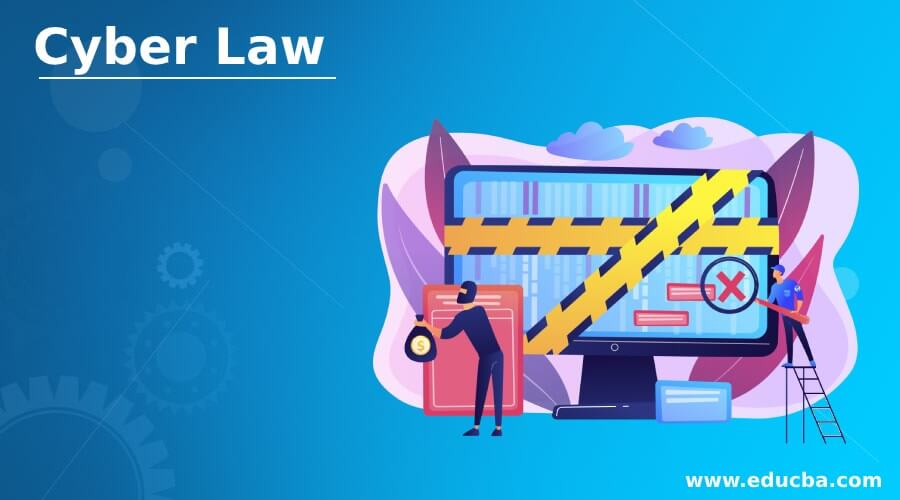Updated April 4, 2023
Introduction to Cyber Law
The overall legal framework of cyber law is concerned with the information infrastructure and regulates the automated exchange of information, e-commerce, applications, and information protection. It is related to lawful computation and electronics, including IT, applications, computers and hardware. It encompasses a variety of sectors, such as Internet connectivity and use, including different subtopics, freedom of speech and online privacy. Cyber regulations lead to the prevention or prevention of large-scale cyber-criminal ism by protecting access to information from unauthorized individuals, freedom of speech relating to Internet use, anonymity, correspondence, electronic communications, websites, intellectual property, hardware and software, for example, data storage devices.
Owing to the rapidly rising internet traffic every day, a higher number of legal concerns worldwide have emerged. Owing to the discrepancies in cyber regulations, restitution varies from fines to jail, and compliance is complex. For those using the Internet and running an online enterprise, Cyberlaw provides legal security. It is most important for Internet users to know their country’s local area and cyber law, from which they can understand what actions on the network are legal or not. They can also prohibit us from behaving without authorization.
Why Cyber Law is Important?
- There are also security problems with using the Internet and even various malicious individuals who want unauthorised access to the computer device and commit future fraud.
- Therefore, every rule, cyber law is created to protect internet organizations and individuals on the network form unwanted access and malicious people.
- When a person commits criminal acts or breaks cyber laws, they propose to individuals or associations or take actions against them.
What is Involve in Cyber Law?
These laws concern numerous internet practices and areas for a variety of reasons. Some laws are created to define Internet and device policy within an entity, and others are developed to provide citizens with protection and harmful activity by unauthorized users.
There are different general categories under cyber legislation:
1. Scam
There are numerous internet frauds and scams which can damage any business or individual person directly. Cyber legislation provides many means of protecting individuals and combating cyber data fraud and financial crimes.
2. Fraud
Cyber laws are developed to deter cyber financial offences, such as identity fraud, credit card robbery and others. If a person commits some form of identity fraud, he can face confederate or State criminal charge. Strict policies to continue and protect against complaints of Internet use have been clarified in these rules.
3. Copyrighting Issues
The Internet is the center of numerous data forms and can be reached everywhere, anywhere. But it is everyone’s right to copy every other person’s content. In cyber laws, the stringent rules are established if anyone goes against copyright to protect people and corporations artistic work.
How to Protect Yourself on Internet?
Although the Internet is a resource containing numerous types of content, many hackers or non-authorized users are likely to hurt you to thief your personal information. Here are all the precautions that will assist you in keeping your personal data and computers secure using the Internet. Even if they use the kind of machine, software or operating system, all measures or recommendations can be useful for all computer users.
1. Use a Safe Password
It is also strongly recommended that you use very secure passes like online bank sites or other sites containing sensitive information; for all sites that need the user ID and password, you can use a separate and strong password. If you wanted assistance to recall your secret, you might use a password generator.
2. E-mail is Not Encrypted
If you send sensitive information via email, unauthorized users will read or interpret it because email is not encrypted. Confidential details like debit card, credit card, address, etc., can then not be submitted via e-mail.
3. Phishing Scams
There are several phishing scams and tactics that can make the confidential information more dangerous. Therefore, all sorts of methods must be familiarized. Hackers mostly attack websites that need a login, eBay, including PayPal, Amazon, online banking, etc.
Importance of Cyber Law
- Cyber regulation is established to prosecute those who carry out unlawful cyber practices.
- These concerns, such as cyber abuse, assaults on another site or individual, stealing records, disturbing every enterprise’s online workflow, and other criminal activities, are necessary to be prosecuted.
- When anyone violates the cyber law, it is on the grounds of the kind of cyber Law he violated, where he lives, and where he broke the law that action is taken against the individual.
- The most critical thing is to prosecute or retract hackers because most cybercrimes exceed the boundary of a felony, which is not a typical crime.
Conclusion
In this article, we have seen what Cyber law is and how it helps regulate the users’ online activities.
Recommended Articles
This is a guide to Cyber Law. Here we discuss the introduction, why it is important? What is involve? How to protect yourself on the internet? Importance. You may also have a look at the following articles to learn more –


